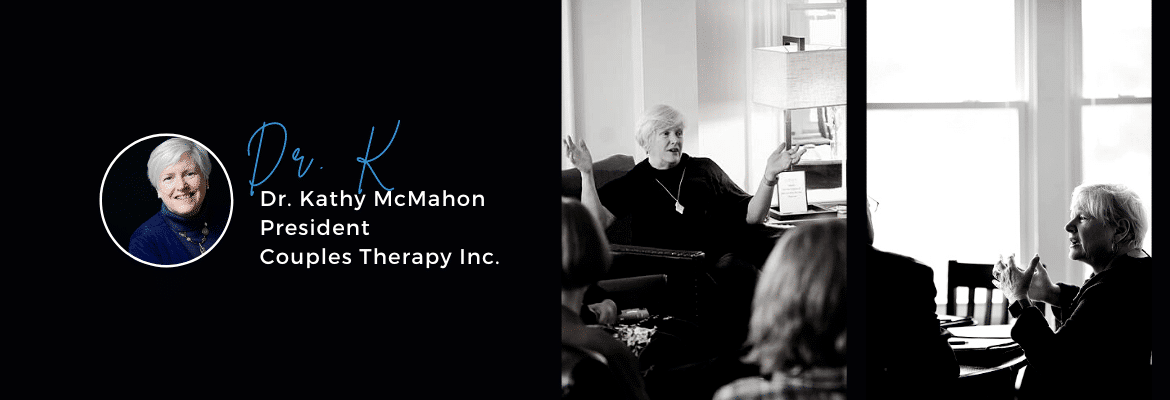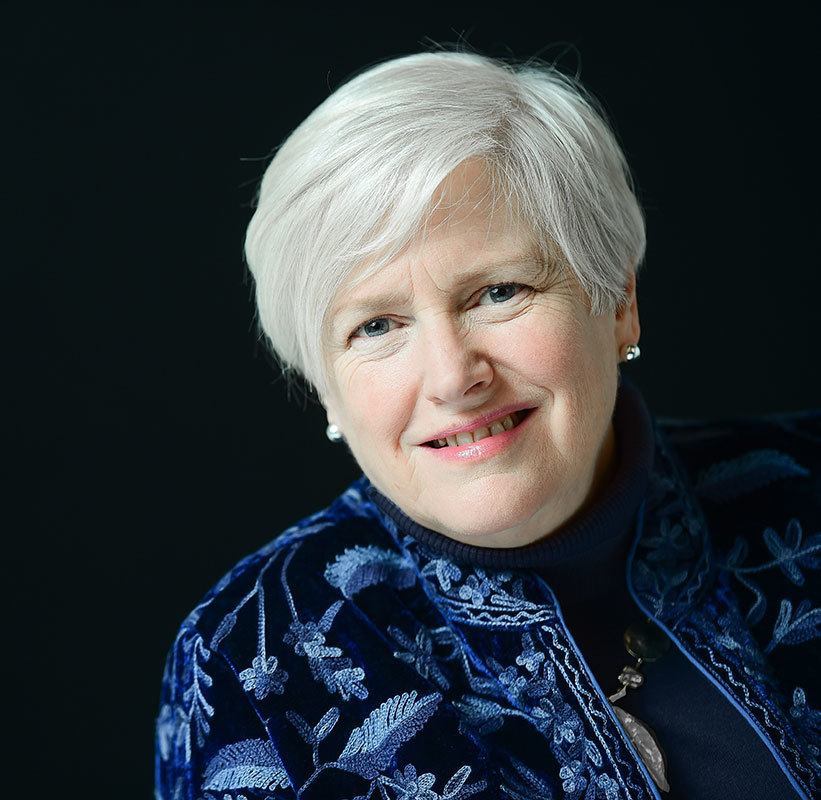
Dr. Kathy McMahon, Psy.D., is a licensed psychologist in Massachusetts, and has worked with couples on their relationship and sexual issues for the past quarter-century. She founded Couples Therapy Inc, where she practices internationally online, and Boston, and in Western Massachusetts, and trains clinicians to work effectively in online couples counseling. Her special interests include the struggles of international couples, neuro-atypical bonds (such as high-functioning Autism, and ADHD), application of couple therapy principles to an online platform, and effectively treating couples intensively in two- and three-day formats. She teaches in the doctoral program in Clinical Psychology at Antioch University New England and in the graduate program at Cambridge College in Cambridge, MA. Her work has been featured on CBS – New York. She is also a proud member of ISMHO.
Question: Describe the most exciting work you have done.
Answer: At this point, I’m seeing couples internationally online. This is a particularly exciting development because it requires a level of training and technical expertise that I’ve developed over time. A thorough assessment of the couple’s dynamics is essential. I do that online as well. Many of the couples I see do not have access to English speaking therapists, never mind someone specializing in couples and sex therapy.
These couples live completely different lives than people in similar professions in the U.S.A. They have typically much more domestic labor and childcare help, as well as greater stressors in their mobile lifestyle. They also typically commit to employment contracts for a period of time, and sometimes this involves employment contracts as a couple, and housing accommodations, as in the case of international teachers. This makes marital distress, and the desire for separation or divorce even more complex than it would ordinarily be.
Question: What are you currently working on?
Answer: At this point, I am reaching out to, and training licensed psychotherapists who are interested in developing expertise in working with couples online. I’m in the process of creating a network of colleagues within the United States that will allow me to refer to qualified professionals in states where I’m not personally licensed. We’ll develop a premier network of professionals devoted to these couples both within and outside the USA. I’m particularly interested in bilingual and trilingual professionals, and those with expertise in working with particular ethnic identities. It’s an exciting time to be a couples therapist online.
Question: How do you envision mental health online growing internationally?
Answer: There is no question that couples living outside the USA need services, and particularly services by clinicians that are familiar with the special needs and lifestyles of the international couple. I’ve taught cross-cultural sensitivity and ethnic differences to marriage and family therapy graduate students at several New England schools of psychology over the years. Not knowing things is often not the problem in working successfully with these couples.
To quote Mark Twain: “It ain’t what you don’t know that gets you into trouble. It’s what you know for sure that just ain’t so.” Sometimes I’m juggling three understandings of problematic rituals or symbols: My own, the husband’s, and the wife’s, as each of us is from a different culture or country. While our common language is English, it might not be the native language for anyone but me.
Questions such as:
- How do we discipline our children?
- What are the proper roles for men and women, (both in the cultures they come from and the country they currently live in)?
- What are “comfort foods?” Foods we eat to feel calm and relaxed?
- Which holidays do we celebrate? Why?
- Do we invite friends to our home? Meet in a café?
These questions should be answered by all couples in a thoughtful way, but when you are dealing with International Couples, the pressure to systematically explore them in a safe atmosphere is crucial. A wife might spend hours cooking a dish she believes is “traditional” for her husband, who, it turns out, would rather eat a burger. Or one believes that having a child sleep in their bed is the norm, until they are weaned, while their partner wants to bottle feed and keep them in their own beds. And sometimes it is the wife that’s advocating the bottle and a bed to herself!
There is all sort of confusion within the couple about the meaning of things like gender roles, appropriate sexual behavior (including extra-marital affairs), and “what emotions mean,” for each of them. International couples smash all sorts of stereotypes, because they often have to be special sorts of people to even BE international couples. The therapist must cultivate a discipline of carefully examining fundamental assumptions, assumptions that, for cultural reasons, may be outside of their field of awareness. Working with International Couples around the world takes particular skills and knowledge to provide clinically effective help.
Question: What has been the most challenging aspect of working in mental health online?
Answer: There are many. For me, a big one is getting either close enough to both people (via the camera), or a sufficiently robust web connection that allows me to detect subtle facial expressions. That’s easier to do with an individual, than with two people in front of one camera. The second challenge is temporal, that is finding the appropriate time to see people.
To date, I’ve worked with international couples from all over the world, and this can make scheduling a challenge. While12 hours ahead (such as China) makes it easy to figure an appointment time, there are some countries that don’t have Daylight Savings Time, so even a simple switch like that can become problematic!
When I see people at 11 pm (their time), because that is the only reasonable time for me, (mid-morning my time), I have to appreciate the fact that their internal clocks are dramatically different than mine while we’re in session. They are ready for bed, while I’m starting my day.
Another challenge is turning people away, when I know they need help…recognizing the limitations of working online. For many of them, I know they can’t just turn to the therapist down the street, because there isn’t one. The training I’ve done has made me wary of working with couples “in crisis.”
I set up pretty rigorous requirements for the couples that see me online, including the online questionnaire I mentioned earlier, that can take each of them hours to complete. I know how therapeutic it can be, but it still requires a lot from each of them.
It is important that they understand that the online work I do is every bit as rigorous, and perhaps more so, than the face-to-face couples therapy or intensive retreats I do with couples. I need to determine in advance that they can benefit from my help.
Question: Are there words of advice can you provide for inspiring mental health professionals interested in beginning their practice online?
Answer: Get a lot of training. Don’t think if you’ve Skyped with friends, you can do online psychotherapy. And don’t use a non-HIPPA compliant service like Skype. Online work is similar to the Harlem Globe Trotters. They have to be incredibly good basketball players to look as comic and goofy as they seem. Online work requires you to be better than average.
You are at a distinct disadvantage by not being in the room with the couple, feeling them emotionally, sensing the subtle changes and emotional shifts that happen. That has to be compensated for by exceptional diagnostic and clinical skills. You have to be bold enough to ask “Are your eyes tearing up right now?” when you can’t exactly be sure.
And everyone has to realize that “retrieving the lost connection” is part of the process, that replaces things like “finding parking.” It is a balancing act where the “optimal” on-line experience is sometimes elusive, but getting closer every year.


